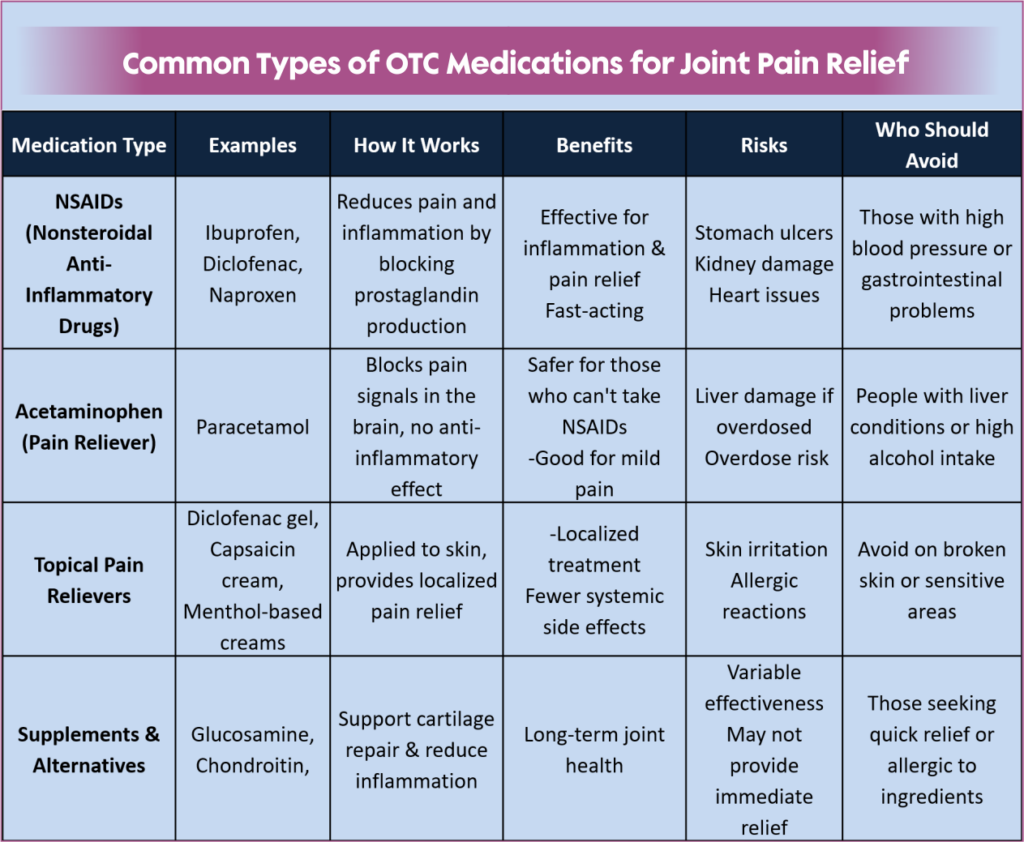Joint pain is a common issue in India, affecting millions of people due to conditions like osteoarthritis, rheumatoid arthritis, and general wear and tear from aging. This type of pain can lead to discomfort, swelling, and restricted mobility, making everyday tasks difficult. While there are many ways to manage joint pain, over-the-counter (OTC) medications are a popular choice for fast relief. But are these OTC medications truly safe for long-term use? In this blog, we’ll explore common OTC treatments for joint pain, their benefits, risks, and how to use them safely.
For individuals seeking expert care for chronic joint pain, TX Hospitals Hyderabad, renowned for joint pain treatment in Hyderabad, offers advanced care tailored to individual needs.
Common Types of OTC Medications for Joint Pain Relief
There are several types of OTC medications available in India to relieve joint pain. These medications work in different ways to address pain, inflammation, and discomfort. Here’s a breakdown:

While OTC medications can be highly effective for joint pain relief, they come with certain risks, especially when used improperly.
Benefits of OTC Medications for Joint Pain Relief
OTC medications are widely available, making them a convenient and affordable solution for many individuals dealing with joint pain. Some of the key benefits include:
- Easy Accessibility: OTC medications can be found in pharmacies across India, and they do not require a prescription, allowing for quick relief from mild to moderate pain.
- Affordable: Compared to prescription medications or advanced treatments, OTC options are cost-effective for short-term relief.
- Quick Relief: Whether you’re experiencing occasional joint pain or a temporary flare-up of arthritis, OTC medications can provide fast relief, helping you continue with your daily activities.
- Non-Invasive: OTC treatments are non-invasive, making them an attractive first-line option before considering more aggressive treatments.
For professional advice, consult TX Hospitals Hyderabad, recognized for offering effective joint pain treatments in Hyderabad with the guidance of orthopedic experts in Hyderabad.
Safety Guidelines for Using OTC Medications
To safely use OTC medications for joint pain relief, follow these guidelines:
- Follow Dosage Instructions: Stick to the prescribed dosage to prevent potential side effects. For instance, adults should avoid exceeding the maximum daily dose of acetaminophen, which is 4,000 mg
- Avoid Mixing Medications: Do not take multiple pain relievers simultaneously without consulting a healthcare provider, as this can lead to harmful interactions or overdose.
- Consult a Healthcare Provider for Persistent Pain: If joint pain persists or worsens despite using OTC medications, it’s essential to consult a doctor to rule out underlying conditions and discuss other treatment options.
Alternatives to OTC Medications
While OTC medications can provide temporary relief, there are several non-drug alternatives that can also help manage joint pain:
- Physiotherapy and Exercise: Low-impact exercises like swimming, walking, and cycling can improve joint mobility and reduce pain. A physiotherapist can help you create a customized plan.
- Hot and Cold Therapy: Applying ice packs can help reduce inflammation, while heat packs can relax stiff muscles and ease chronic pain.
- Weight Management: Maintaining a healthy weight reduces strain on weight-bearing joints like the knees and hips, helping alleviate pain.
- Mind-Body Approaches: Techniques such as yoga, meditation, and deep breathing can help reduce stress and improve flexibility, contributing to pain management.
- Acupuncture and Massage: These therapies can promote relaxation, reduce tension, and improve circulation, providing additional relief for joint pain.
Conclusion
Over-the-counter medications, including NSAIDs, acetaminophen, and topical pain relievers, can be effective for managing joint pain and inflammation. However, it’s crucial to use them safely by following dosage instructions and consulting a healthcare provider when necessary. For long-term relief, consider incorporating non-drug treatments like physiotherapy, exercise, and weight management into your routine.
If your joint pain persists or worsens, it’s important to seek professional advice to explore other treatment options.
Call to Action:
If you’re experiencing ongoing joint pain or need guidance on safe pain relief methods, contact TX Hospitals, Hyderabad today. Our top orthopedic specialists in Hyderabad provide personalized care to help you regain mobility and live pain-free. Relief is within reach-start your journey to better joint health now!








